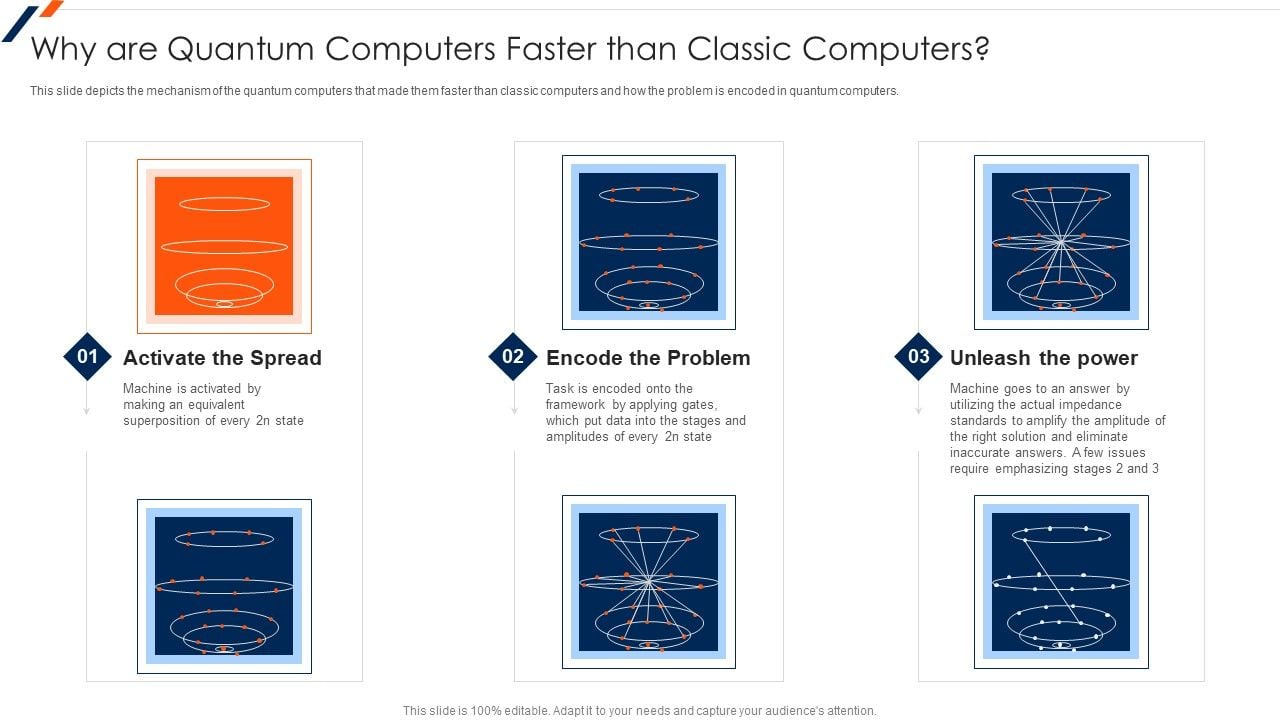Are quantum computers truly faster than their classical counterparts? This question lingers tantalizingly in the air, evoking a blend of curiosity and skepticism that challenges the very fabric of our understanding of computational capabilities. As we delve into the complexities of quantum versus classical computing, we must first consider the intrinsic dichotomy between these two paradigms.
Classical computers, which have dominated the technological landscape for decades, operate on the principles of classical mechanics. They process information using bits that exist in binary states—0 or 1. This binary system forms the backbone of computation. Classical computing is characterized by its reliance on a defined sequence of logical operations, manipulated through transistors that switch on and off to perform calculations. Such a mechanism allows for the execution of complex algorithms, albeit at a predetermined pace dictated by the combination of hardware and software efficiencies.
However, the advent of quantum computing introduces a paradigm shift. Quantum computers transcend the limitations of binary processing by employing quantum bits, or qubits, which embody the principles of superposition and entanglement. Superposition allows a qubit to exist simultaneously in multiple states, thereby enabling quantum computers to process vast amounts of information concurrently. Imagine flipping a traditional coin: it is either heads or tails. In contrast, a qubit performs a unique dance, existing in the realm of both heads and tails until measured. This characteristic exponentially enhances a quantum system’s computational potential, permitting it to solve exponentially complex problems.
The interplay of qubits emerges even more intriguing when applied to entanglement. When qubits become entangled, the state of one qubit instantaneously correlates with the state of another, regardless of the distance separating them. This mysterious connection allows quantum computers to perform calculations that are fundamentally unattainable for classical machines. For example, Shor’s algorithm, which is capable of factoring large integers efficiently, poses a significant challenge to classical cryptography systems. Herein lies a prime area where quantum computers showcase their potential supremacy.
Yet, the assertion that quantum computers are categorically “faster” than classical computers invites scrutiny. The distinction between speed and efficiency becomes crucial in this discourse. Quantum speedup is conditionally contingent upon the nature of the problem being solved. While quantum algorithms excel in specific realms, such as optimization problems and simulations of quantum systems, classical computers retain advantages in areas where algorithms have been fine-tuned over decades.
This divergence prompts a profound contemplation: are we venturing into a future where quantum supremacy is ubiquitous, or are we grappling with a more nuanced reality where classical and quantum systems coexist symbiotically? The quest for a definitive answer necessitates examining real-world applications of both computing paradigms.
In instances such as database searches and certain types of optimization, quantum algorithms can, in theory, outperform classical counterparts. Grover’s algorithm, for instance, can search an unsorted database quadratically faster than classical algorithms. This development ignites a frenzy of possibilities in fields like logistics and supply chain management, indicating that quantum computers may redefine operational efficiencies.
Nevertheless, the deployment of quantum computers faces inherent challenges. The phenomenon of decoherence presents a formidable obstacle, leading qubits to lose their quantum state due to environmental interference. This fragility makes maintaining quantum coherence—a prerequisite for actual computation—profoundly intricate. As researchers endeavor to create fault-tolerant quantum systems, significant advancements must be made in error-correction protocols to harness the full power of quantum computing.
Comparatively, classical computers benefit from a well-established infrastructure, extensive software ecosystems, and an abundance of technological support, making them more accessible for general application. Quantum technology, still in its nascent stage, requires substantial investments in research and development to reach a level of maturity comparable to classical computation.
Moreover, the ethical implications of quantum computing cannot be ignored. The potential to break widely-used encryption methods evokes concerns over data privacy and security. The paradigm shift in computational power heralded by quantum technology necessitates ground-breaking advancements in cryptographic techniques to safeguard sensitive information in the digital age. Quantum key distribution, which leverages principles of quantum mechanics to enhance security, is one such avenue currently under exploration.
As we examine the landscape of computing technologies, the question remains: how do we define speed in the context of computing? Is it raw processing power, the swiftness of data retrieval, or the ability to solve complex challenges efficiently? The dichotomy between quantum and classical systems offers fertile ground for future exploration—where functionality and performance coalesce in unexpected ways.
In conclusion, while quantum computers possess the potential to outpace classical ones in specific scenarios, the underlying dimensions of computational performance and applicability reveal a complex narrative. The journey toward definitive answers and practical implementations of quantum computing is at the forefront of scientific inquiry, compelling us to reconcile the elegance of quantum mechanics with pragmatic and immediate technological demands. Embracing this duality promises to yield not only insights into the very nature of computation but also groundbreaking applications previously relegated to the realm of theoretical possibility.












